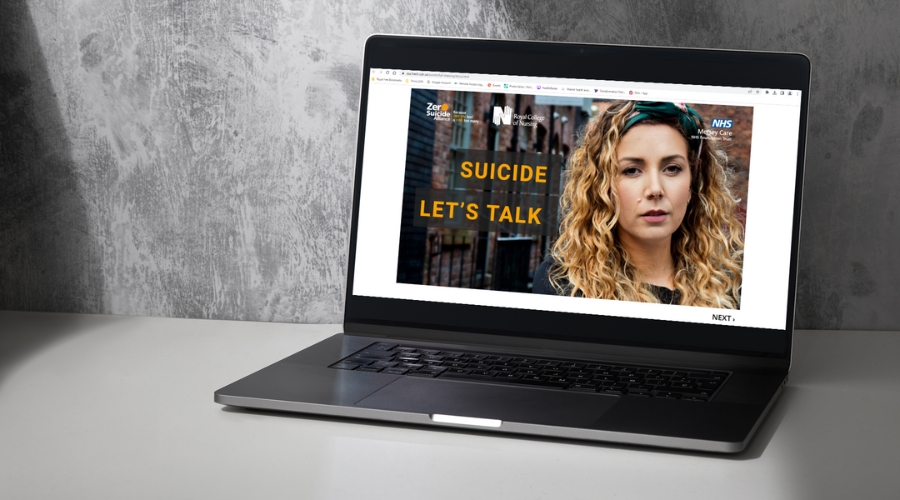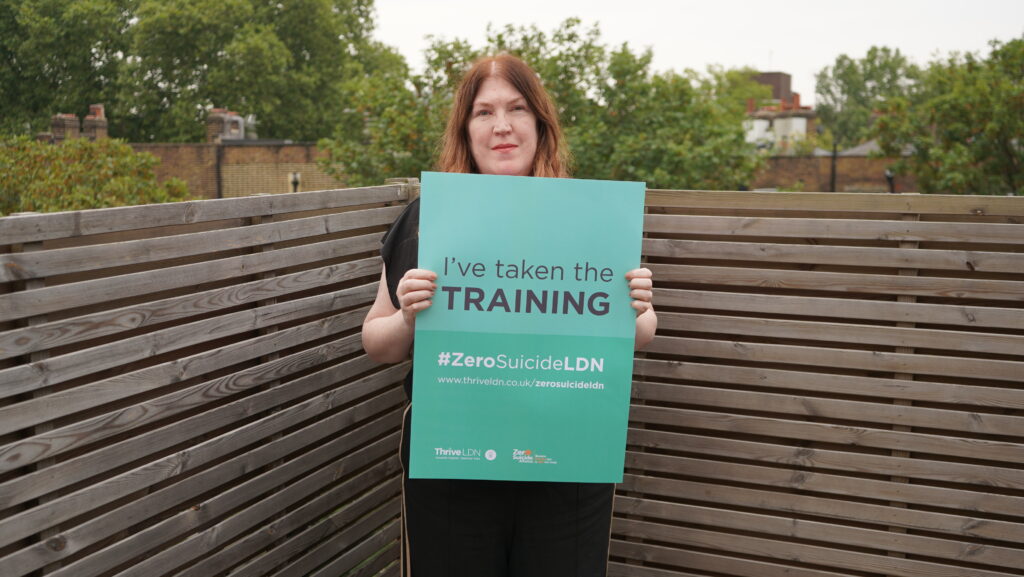
- Five years since the Mayor of London launched citywide campaign, nearly 415,000 suicide prevention training sessions have been completed by those living or working in London.
- During the last twelve months, on average 1 in 4 (25 per cent) of the total number of globally completed training sessions are being completed in London each month.
- Strength of response in capital highlights the ‘spirit of Londoners to look out for other Londoners’, with London’s health leaders encouraging even more people to take the training.
- The training is an invaluable free resource for those who have a supporting role in the community or professionally, including for London’s Bridge Watch volunteers.
Launched five years ago by the Mayor of London on World Suicide Prevention Day (WSPD) 2019, the citywide #ZeroSuicideLDN campaign has now supported 414,536 people across the capital to access free, online suicide prevention training.
Developed by the Zero Suicide Alliance, the free, online training takes around 20 minutes to complete and is designed to show how to have a direct and honest conversation about suicide and mental health with friends and family. The training also helps to break the stigma of talking about mental health, suicidal thoughts and bereavement. To date, 2,704,016 have accessed the ZSA training worldwide.
Through the #ZeroSuicideLDN campaign, during the last twelve months, on average 1 in 4 (25 per cent) of the total number of globally completed training sessions are being completed in London each month.
#ZeroSuicideLDN campaign organisers have highlighted how the capital’s consistently high participation demonstrates the spirit of Londoners to play their part in looking out for other Londoners. As well as showcasing the collective effort from across London health and care partners, blue light and public sector agencies, charities, London’s business community, and many others to support the citywide campaign.
The Mayor of London, Sadiq Khan, said:
“One life lost to suicide is one too many and we can all play a role in preventing such tragedies by helping one another and talking more about mental health. It’s been five years since I launched the #ZeroSuicideLDN campaign, which offers online suicide prevention training. I’m proud to be one of more than over 400,000 people living or working in London who have completed the training and it’s important that we encourage even more people to take part, so we can continue to build a better London for everyone.”
The #ZeroSuicideLDN campaign is led by London’s public health partnership, Thrive LDN. Marking the campaign’s five-year anniversary, Thrive LDN director, Dan Barrett, thanked everyone who has supported the campaign. Barrett also stressed how ‘it remains more important than ever’ to encourage many more to take the training to help break down the stigma of talking about suicide and mental health.
In a survey by the charity Mind, more than one in three UK adults (36 per cent) said they never make space in their day or the time to speak about their mental health. Yet nearly 8 in 10 who responded (78 per cent) said that their mental health has been affected by cost-of-living crisis – this was worse for those with existing mental health problems (94 per cent).
Dan Barrett, Thrive LDN director, commented:
“It is very encouraging to see the number of people who have taken the training since the #ZeroSuicideLDN campaign launched five years ago. However, a lot has happened since which makes people more vulnerable to suicide or crisis.
“In London, the sad truth is suicide is the cause of death of around 10 Londoners every week.Debt is a significant risk factor of suicide and for many Londoners it remains a challenging time with increased cost-of-living pressures being felt unevenly across the capital. Financial concerns are not always commonly discussed. Many people may feel a sense of shame about their situation or do not typically discuss personal finance with others. Therefore, the free training remains as relevant and more important than ever.”
The Zero Suicide Alliance training has proven to be an invaluable free resource for those who have a supporting role in the community or professionally too.
London’s Bridge Watch programme coordinator has highlighted how the training is a key part of the onboarding for new volunteers to increase their confidence and knowledge on what questions to ask when intervening with vulnerable individuals. Bridge Watch volunteers proactively monitor the areas on and around the bridges of London and have a brief to engage with anybody indicating intent to enter the water.
Paul Maloney, Bridge Watch coordinator, said:
“We get a lot of interest from people who want to volunteer but might be unsure if this is a role they’re able to do or what exactly will be asked of them. The Zero Suicide Alliance training is the first thing any potential new volunteers are asked to complete as it’s a helpful way of showing that anyone can do this.
“The importance of spotting signs of distress, active listening, and showing empathy and understanding to someone in need is what can make a difference and save a life. All our volunteers undertake further training, but the Zero Suicide Alliance training is an important part of someone’s introduction and supports their decision to become a volunteer with Bridge Watch.
“We are fully behind the #ZeroSuicideLDN campaign and actively help promote this in other settings, meetings, or networking sessions. The more people who take the training across London means more people who feel confident and able to act and support someone who may be reaching a point of crisis, wherever that may be.”
TfL River Services operations manager, Matthew Hack, has also spoken about how all staff are encouraged to take the Zero Suicide Alliance training as an additional training resource to aid them in their role of supporting users of the river.
Professor Kevin Fenton CBE, Regional Public Health Director for London, said:
“Around eleven people take their own lives in London each week. That’s a number we can’t ignore because it doesn’t have to be this way. By taking targeted action and working closely together, we can save lives.
“World Suicide Prevention Day is an opportunity to remember that it has never been more important for each of us to think and talk more about mental health and wellbeing.
“I’m encouraging all Londoners to take the Zero Suicide Alliance’s free 20-minute online training and then tell your friends, colleagues, and family about it too. With all of London working together, we can look out for one another, spot the signs, and be prepared to save a life.”
Martin Machray RN, Executive Director for Improvement, Transformation and Partnerships for NHS England – London, said:
“London works best when we look out for each other. It’s such positive news that so many people across the capital are taking suicide prevention training each month to develop the skills and confidence needed to better identify suicidal thoughts and behaviour.
“The reasons why someone would choose to take their own life are complex. All Londoners, at all stages of their life, deserve the chance to feel well, think clearly and live with a sense of purpose and enjoyment.
“The NHS in London fully supports the #ZeroSuicideLDN campaign to go even further, encouraging even more Londoners to take the training and support people to seek help when it is needed. Together, we can support people to talk openly about suicide and mental health.”
Cllr Dr Jacqui Dyer MBE, mental health equalities advisor for NHS England and co-lead of Thrive LDN, said:
“We know that living and working in London can be stressful, and right now for some it may be overwhelming. That is why we want to encourage as many people as possible to take free, online training to know what to do if a loved one, colleague or stranger is in crisis.
“By doing so, we are working towards a city that is stigma free, where people can have a more direct and honest conversation about suicide with fellow Londoners in a safe and sensitive way. Especially considering the challenges so many Londoners – and particularly those from marginalised and racialised communities – have faced in recent years.”
Dr Phil Moore, Co-Chair of Thrive LDN’s Suicide Prevention Group:
“World Suicide Prevention Day is an important opportunity to encourage everyone to access the Zero Suicide Alliance’s free training, which is more important than ever.
“The training takes around 20 minutes to complete and is designed to help people to identify warning signs and to feel comfortable having conversations about suicide with friends and family. By thinking and talking more about our mental health, we can break the stigma surrounding suicide and mental health.
“It is only through continued efforts to support whole communities to come together and address the causes of poor mental health that we can meet our shared aspiration of making the capital a ‘zero suicide’ city.”
To find out more about these resources and the suicide prevention training, visit www.thriveldn.co.uk/zerosuicideldn.
Further information and support
If you’re concerned about your mental health, your GP is always a good place to start. If you feel very distressed and can’t wait, or feel unable to keep yourself safe, there is more immediate help available:
- Samaritans. To talk about anything that is upsetting you, you can contact Samaritans 24 hours a day, 365 days a year – call 116 123.
- Shout. Shout offers a confidential 24/7 text service providing support if you are in crisis and need immediate help. If you would prefer not to talk but want some mental health support, you could text SHOUT to 85258.
If your life or someone else is at imminent risk, please call 999 for immediate help.
As of the end of August 2024, a total number of 414,536 training sessions were recorded in London.
For more information, please contact Thrive LDN communications lead, James Ludley: james.ludley@nhs.net / 07880 068221.
ENDS

Notes to editors
Overview (below uses ONS data, release Aug 2024)
- There were 6,069 suicides registered in England and Wales in 2023; this is an increase (7.6%) compared with 2022 and the highest rate seen since 1999.
- London had the lowest rate of any region in England. On average, around 11 Londoners per week took their own life in 2023.
- Suicide is the leading cause of death in people aged 15–34, and the biggest killer of men under 49 in the UK.
- Around three-quarters of those who take their own lives are men. Yet, the female suicide rate reached its highest level since 1994.
- The age-specific suicide rate was highest for males aged 45 to 49 years, and for females aged 50 to 54 years.
#ZeroSuicideLDN campaign resources and assets
- WSPD 2024 #ZeroSuicideLDN campaign video is published to YouTube and open for embedding: https://www.youtube.com/watch?v=MFh5uaaSDg8
- Bridge Watch coordinator talking about the training and how it’s helping the volunteers: https://youtu.be/rnN5lVE8AGw
- Download a range of promotional #ZeroSuicideLDN digital resources via Thrive LDN Google Drive
#ZeroSuicideLDN campaign 2023/24 – participation
| Month | London participation number | Global ZSA participation number | London as % of monthly overall |
|---|---|---|---|
| 23-Jun | 3,901 | 15,086 | 26% |
| 23-Jul | 2,793 | 14,614 | 19% |
| 23-Aug | 4,578 | 12,344 | 37% |
| 23-Sep* | 9,632 | 30,331 | 32% |
| 23-Oct | 5,719 | 24,518 | 23% |
| 23-Nov | 4,698 | 17,105 | 27% |
| 23-Dec | 2,454 | 10,863 | 23% |
| 24-Jan | 4,518 | 14,276 | 32% |
| 24-Feb | 3,514 | 18,520 | 19% |
| 24-Mar | 3,549 | 14,399 | 25% |
| 24-Apr | 5,169 | 27,909 | 19% |
| 24-May | 4,603 | 17,623 | 26% |
| 24-Jun | 3,596 | 15,408 | 23% |
| 24-Jul | 3,119 | 13,176 | 24% |
| 24-Aug | 3,937 | 17,397 | 22% |
| AVERAGE | 4,385 | 17,230 | 25% |
*In September 2023, ahead of World Suicide Prevention Day 2023, the Mayor of London wrote to senior leaders, including NHS, Met Police, TfL, Fire, to thank them for their work to support Londoners and those within their own organisations. The mayor also reminding colleagues of the training and resources available to help people spot the signs of suicide risk, understand trauma, and have life-saving conversations and encouraged continued participation in the #ZeroSuicideLDN campaign.
About Thrive LDN
Thrive LDN is a citywide public mental health partnership to ensure all Londoners have an equal opportunity for good mental health and wellbeing. Launched publicly by the Mayor of London and the London Health Board partners in 2017, Thrive LDN has evolved and grown significantly in the past five years.
Thrive LDN is the regional lead for suicide prevention in London on behalf of NHS England. As part of that role, they facilitate the multi-agency Thrive LDN Suicide Prevention Group to deliver citywide projects to prevent suicide and support those affected by suicide.
Two million Londoners experience some form of poor mental health every year and Londoners’ life satisfaction and feelings of self-worth are lower than the national average. Thrive LDN was established in response to this, with the aim of reducing the number of Londoners affected by poor mental health.
About the Zero Suicide Alliance
The Zero Suicide Alliance (ZSA) is UK based and hosted by Mersey Care NHS Foundation Trust and funded via Mersey Cares NHS Charity. The Alliance is a collaborative of National Health Service trusts, businesses and individuals who are all committed to suicide prevention and beyond. The Alliance is ultimately concerned with improving support for people contemplating suicide by raising awareness of and promoting free suicide prevention training which is accessible to all.
Cost-of-living considerations
Financial resilience and feelings of control relating to finance have a profound impact on people’s wellbeing. For many, there continues to be extreme challenges posed by the increases to the cost-of-living, which in turn means more Londoners will be considered vulnerable to suicide.
A study, by the ESRC Centre for Society and Mental Health and the Policy Institute at King’s College London, also found certain groups are more likely than others to be negatively affected by the crisis:
- 80% of people who said they were struggling financially reported feeling negative about life over the next year given rising costs, – far higher than the figure for people who said they were coping financially (31%).
- 39% of social housing tenants report struggling to sleep because of increasing costs, compared with 15% of those who own their home outright.
- 38% of people with a diagnosed mental health condition felt that they lacked control over their finances, compared to 24% of the general population.
- 73% of people asked felt that the UK government does not care about people like them, rising to 89% of people who said that they were struggling financially, and 86% of people with a diagnosed mental health condition.
It therefore remains more important than ever to encourage many more Londoners to play their part in looking out for others by supporting the #ZeroSuicideLDN campaign.
By thinking and talking more about our mental health and how this is impacted on the environment around us, we can break the stigma surrounding suicide and mental health.

